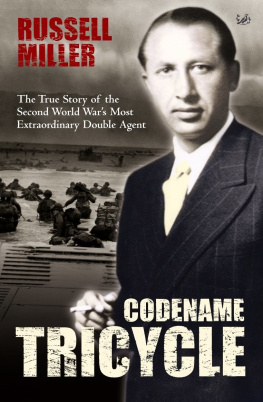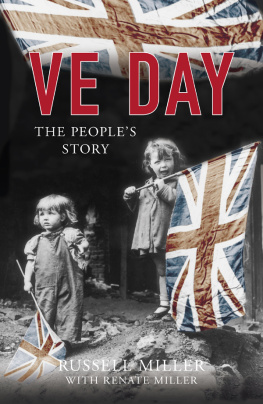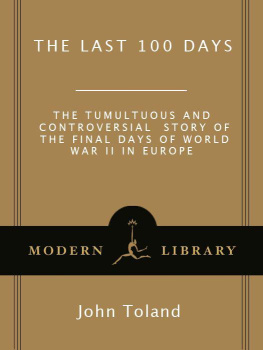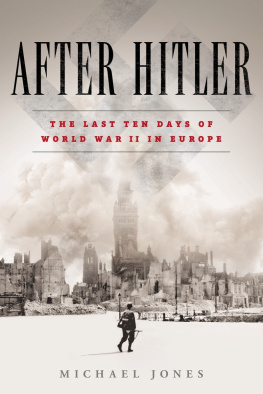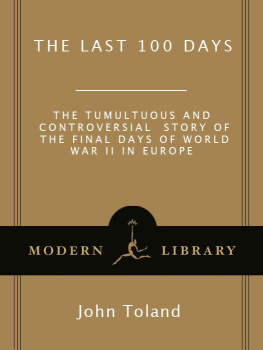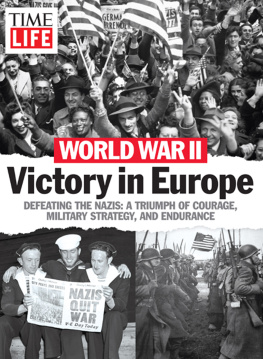Ten Days in May
THE PEOPLES STORY OF VE DAY
Russell Miller with Renate Miller

Let war yield to peace, laurels to paeans
Cicero (10643 BC)
Contents
One of the problems about writing an oral history of VE Day is that 50 years have passed and memories are fading. It was not a difficulty with our oral history of D Day because many of the veterans who took part in such a dramatic moment of history had an extraordinarily clear and detailed recall of everything that happened to them on that day. Being in Normandy on 6 June 1944, was something you did not forget.
VE Day is different, as we rapidly discovered. Denis Norden, for example, could remember nothing except being maudlin in a tent on Lneberg Heath. Lord Hailsham, perhaps understandably, could only recall that his son, Douglas, was christened in the crypt at the House of Commons on that day. Sir John Mills said he was too young to remember anything and Donald Sinden explained he was so busy entertaining the troops he didnt even know it was VE Day! Sir Robin Days one memory is of being on a troopship and being allowed a single beer, a rare treat, to celebrate. Raymond Baxter, who was a Spitfire pilot, recalls giving joy rides to WAAFs in a little Auster; Sir Hugh Casson only remembers leaving a Ministry of Planning conference in Edinburgh and finding all the streets lamps on for the first time in years. David Kossof vaguely recalls a prolonged knees-up in Lincolns Inn Fields; Lord Carrington, with his battalion somewhere near Freiburg, claimed VE Day was completely unexceptional, just another working day.
It is the fallibility of memory that makes the Mass Observation archive at the University of Sussex such an invaluable resource for any author embarked on a project such as this. Mass Observation was set up in 1937, by the poet and journalist Charles Madge and the anthropologist Tom Harrisson, to record the voice of the people. At the time of VE Day its volunteer observers were out and about recording extraordinarily detailed contemporary accounts of what was happening, what people were saying and thinking. Unfortunately, a condition of being able to make use of the archive is that all contributors remain anonymous, but the authentic colour they provide is irresistible.
The staff at our local library in High Wycombe considered it a personal challenge to seek out every one of the multitude of books we requested and proved, once again, that our library service is second to none and needs to be protected against philistine governments looking for budget cuts.
We would also like to thank the courteous and helpful staff of the Sound Archives and the Department of Documents at the Imperial War Museum, the London Library; particularly Joy Eldridge of Mass Observation; Martin Tapsell and staff of the InterLibrary Lending Department of Bucks County Library; members of the National Federation of Womens Institutes, the Royal British Legion, the War Widows Association and the Burma Star Association. A special word of thanks, too, to John Frost, who manages to keep track of his historic collection of newspapers in a small suburban house in north London and who also wrote a fascinating letter to his mother from Germany on VE Day.
Finally, we must express our gratitude to all those who offered up their diaries, letters and memories and for everyone who agreed to be interviewed. Not everyone could be included in this book, but all the material will be lodged in a suitable archive for the benefit of those people who will undoubtedly be writing about the centenary of VE Day in the year 2,045.
Russell and Renate Miller, Buckinghamshire, 1994.
It is a cherished legend in my family, at least cherished by me, that on the night of VE Day my mother was brought home from the pub in a wheelbarrow. I was only six at the time (well, six and three-quarters), so took no part in the celebrations, but I was thrilled beyond belief when, the following morning, I heard what had occurred. Nothing so risqu, so, so scandalous, had ever happened in the family to my knowledge and I kept pressing various aunts and uncles for more information. Did my mother willingly get into the wheelbarrow? Why? Where did it come from? Who pushed it? Did anyone see?
The ending of the war in Europe meant little to a six-year-old; but his mother coming home from the pub in a wheelbarrow made a deep impression. I suppose in the end I realized that my Mum had been tipsy (the rather charming euphemism then in use for being completely plastered) and that probably everyone else had been tipsy, too.
I knew my Dad went out for pint in the local on a Saturday night and my Mum liked a Guinness - she believed the advertising that it was good for her - but I had never seen or heard of either of them having too much to drink, even at Christmas or family parties. It never crossed my mind that my quiet and very conventional parents, who cared a great deal about keeping up appearances, would ever risk getting drunk. So it was the thought of them merrily weaving home from the pub, with my Dad pushing my Mum in a wheelbarrow, that brought home to me the realization that something truly significant had happened.
If further confirmation was needed that historic events were taking place it came shortly afterwards when I arrived home from school to find a glass bowl in the middle of the dining table containing three curious curved yellow tubes. My older sister, who knew about such things, announced that they were bananas. That evening my mother peeled one of the exotic tubes and my sister and I shared the literal fruits of victory. I declared it to be delicious, although actually I was a bit disappointed.
Two days after VE Day, there was a party on our street. We lived in a working-class neighbourhood on the east side of London, but my Dad was a white-collar clerk and we aspired to middle-class values. Consequently I was the only boy present wearing a tie. I know this because I have still got the black and white group picture of our scruffy little group. There I am, sitting cross-legged in the front row, still apparently unable to grasp the victory concept. All the other kids are giving the victory sign in the approved Churchillian fashion; I, alone, have got it the wrong way round and appear to be making a very rude gesture at the photographer.
Years later, whenever the family got together, my mother, whose name was Queenie, would be teased about VE night: I dont suppose you remember much about that night, do you, Queen? You know, that night they brought you home in a wheelbarrow. My mother would blush and pretend to be cross, but I always had the feeling she was secretly rather proud that she had celebrated the end of the war in Europe with such ostentatious and uncharacteristic abandon.
Interviewing people for this book reminded me very forcibly of how different times were then, how curiously innocent life was. Everyone knew, beyond any shadow of doubt, that we were involved in a just war. The issues were clear: we were fighting on the side of good against the forces of evil, therefore we must, in the end, win. Whatever the price that had to be paid, whatever sacrifices it required, it was worth it. No war has ever been fought so unequivocally.
If anyone did harbour any doubts about the Allied cause, or the necessity for war, they were surely swept away when, in April 1945, the first reports began filtering back to Britain of the discovery of the concentration camps. Most people knew about the existence of the camps, and something of the Nazi persecution of the Jews, but until the advancing Allies had overrun places like Belsen and Dachau and Nordhausen, no one appreciated the sheer scale of the horror. Here, alone, was justification for the war.


